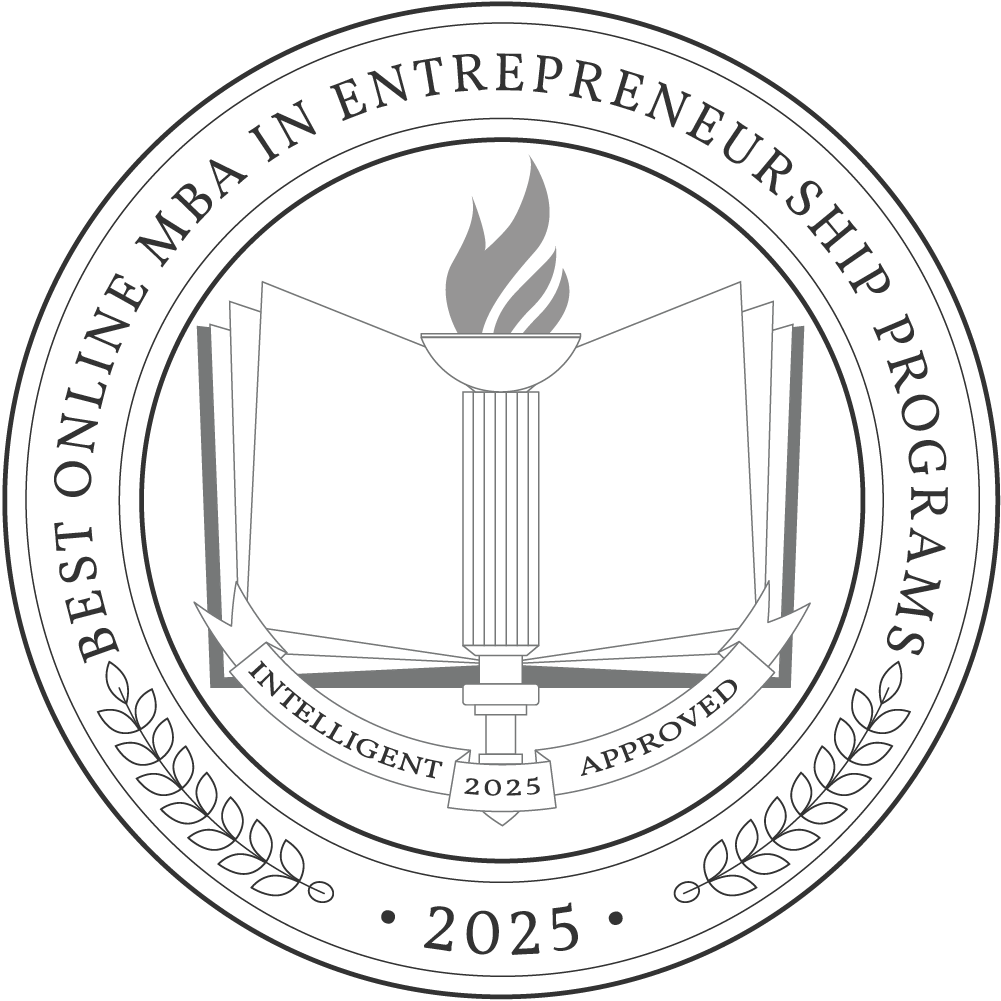An online MBA in entrepreneurship can be what aspiring entrepreneurs need to take their innovation, creativity, and vision to the next level. These programs prepare graduates for exciting roles in various industries, such as startup founder, business consultant, and corporate innovation manager. It typically takes two to three years to earn this degree, and many online programs offer flexible part-time options for learners who need to balance their education with professional and personal responsibilities.
While costs vary across institutions, the average annual tuition for a graduate degree program is $12,596 at public universities and $28,017 at private schools. With the help of financial aid, it’s possible to earn your degree without incurring substantial debt.
We interviewed Michelle Pickett, director of Northern Illinois University’s Academic Advising Center, for her guidance on how students can prepare for a master’s degree program and excel in an online learning environment.
Why Trust Us
The Intelligent.com Higher Education Team is dedicated to providing students with independent, equitable school and program rankings and well-researched resources. Our expert-driven articles cover topics related to online colleges and programs, paying for school, and career outlooks. We use data from the U.S. Department of Education’s College Scorecard, the National Center for Education Statistics, and other reputable educational and professional organizations. Our academic advisory team reviews content and verifies accuracy throughout the year for the most current information. Partnerships do not influence rankings or editorial decisions.
- Analyzed over 2,000 national, accredited, and nonprofit colleges and universities
- 800+ rankings pages are reviewed and updated yearly
- Content is informed by reputable sources, surveys, and interviews with academic advisors and other experts
- Over 100 data points are reviewed for accuracy and quality throughout the year, including sources
How we rank schools
Our list features the best online MBA in Entreprenuership degree programs at top colleges nationwide. Each school featured is a nonprofit, accredited institution — either public or private — with a high standard of academic quality for post-secondary institutions.
We evaluated each school’s program on tuition costs, admission, retention and graduation rates, faculty, reputation, and the student resources provided for online students. We collected data from trusted sources like the National Center for Education Statistics, individual school and program websites, school admissions counselors, and other data sources. Then, we calculated the Intelligent Score on a scale of 0 to 100 based on the following criterion:
Academic Quality:
- Admission rate versus enrollment rate
- Retention rate of students who return after year one
- Accreditation status (regional and programmatic)
- Nonprofit status, both private and public institutions
Graduation Rate
- Overall graduation rate
- Total number of currently enrolled students, including diversity metrics
- Student-to-faculty ratio
Cost and ROI
- In-state and out-of-state per-credit tuition rates and fees
- Required credits to graduate
- Earning potential after graduation
- Availability of federal student loans, scholarships, and other financial aid options
Student Resources
- Available student services for online-only and hybrid programs
- On-campus amenities like tutoring centers and the number of libraries
Read more about our ranking methodology.
Best 44 Accredited Online MBA in Entrepreneurship Programs
FiltersInstitution Type
Status
- Intelligent Score
- Alphabetically By University Name
- Acceptance Rate
- Enrollment
- In-state Graduate Tuition
- Out-of-state Graduate Tuition
- In-state Undergraduate Tuition
- Out-of-state Undergraduate Tuition

University of North Carolina at Chapel Hill
Intelligent Score: 99.55In-state: $7,019
Out-of-state: $34,198
In-state: $10,552
Out-of-state: $10,552
SAT: 1280-1490
ACT: 28-33
Access to a large alumni network is a highlight of University of North Carolina at Chapel Hill’s Kenan-Flagler Business School’s online Master of Business Administration program. There are over 42,000 alumni of the business school around the world, and connecting with them is built into the program. Customization is also key to the program — students have access to more than 25 electives and five concentrations, including entrepreneurship. Although the program is mostly online, students do complete two in-person summits. These are immersive experiences with classmates, faculty, and alumni that are held in cities around the world and on campus in Chapel Hill. Past international summit destinations include Helsinki, London, Mumbai, and Johannesburg.
$2,025
Online
Association to Advance Collegiate Schools of Business
62

University of Massachusetts Amherst
Intelligent Score: 99.5In-state: $15,791
Out-of-state: $35,779
In-state: $14,014
Out-of-state: $14,014
SAT: 1200-1390
ACT: 27-32
$925
Online, On-Campus
Association to Advance Collegiate Schools of Business
39-45

University of Illinois at Urbana - Champaign
Intelligent Score: 99.27In-state: $14,317
Out-of-state: $33,824
In-state: $15,016
Out-of-state: $15,016
SAT: 1200-1460
ACT: 27-33
$332
Online
Association to Advance Collegiate Schools of Business
72

Johns Hopkins University
Intelligent Score: 97.59In-state: $54,160
Out-of-state: $54,160
In-state: $57,010
Out-of-state: $57,010
SAT: 1470-1560
ACT: 34-36
$1,800
Online
Association to Advance Collegiate Schools of Business
54

Babson College
Intelligent Score: 96.33In-state: $54,144
Out-of-state: $54,144
In-state: $89,550
Out-of-state: $89,550
SAT: 1270-1450
ACT: 27-32
$1,990
Online
Association to Advance Collegiate Schools of Business
45

Syracuse University
Intelligent Score: 94.35In-state: $53,432
Out-of-state: $53,432
In-state: $40,392
Out-of-state: $40,392
SAT: N/A
ACT: N/A
$1,872
Online
Association to Advance Collegiate Schools of Business
36

Carnegie Mellon University
Intelligent Score: 94.17In-state: $57,560
Out-of-state: $57,560
In-state: $46,441
Out-of-state: $46,441
SAT: 1460-1560
ACT: 33-35
$758
Online
Association to Advance Collegiate Schools of Business
48

PennState Smeal College of Business
Intelligent Score: 93.08In-state: $15,025
Out-of-state: $24,413
In-state: $22,464
Out-of-state: $22,464
SAT: 1070-1300
ACT: 24-29
$1,248
Online
Association to Advance Collegiate Schools of Business
48

Oklahoma State University
Intelligent Score: 92.88In-state: $5,357
Out-of-state: $20,877
In-state: $5,531
Out-of-state: $5,531
SAT: 1020-1250
ACT: 21-28
Resident: $489
Non-Resident: $530
Online
Association to Advance Collegiate Schools of Business
33-39

Azusa Pacific University
Intelligent Score: 92.65In-state: $40,830
Out-of-state: $40,830
In-state: $16,571
Out-of-state: $16,571
SAT: N/A
ACT: N/A
$680
Online, On-Campus
Western Association of Schools and Colleges
42-45

UT Dallas MBA
Intelligent Score: 92.59In-state: $11,448
Out-of-state: $40,032
In-state: $12,028
Out-of-state: $12,028
SAT: 1210-1470
ACT: 26-33
Resident: $914
Non-Resident: $1,622
Online
Association to Advance Collegiate Schools of Business
53

Ohio University
Intelligent Score: 91.80In-state: $27,574
Out-of-state: $38,254
In-state: $18,138
Out-of-state: $18,138
SAT: 1070-1290
ACT: 22-27
$1,051
Online
Association to Advance Collegiate Schools of Business
35-36

Indiana University
Intelligent Score: 91.28In-state: $9,815
Out-of-state: $36,194
In-state: $9,786
Out-of-state: $9,786
SAT: 1120-1350
ACT: 24-31
$1,758
Online, On-Campus
Association to Advance Collegiate Schools of Business
54

University of Iowa
Intelligent Score: 91.09In-state: $8,073
Out-of-state: $30,036
In-state: $10,079
Out-of-state: $10,079
SAT: 1110-1310
ACT: 22-29
$750
Online
Association to Advance Collegiate Schools of Business
48

UMass Lowell
Intelligent Score: 91.04In-state: $15,791
Out-of-state: $35,779
In-state: $14,014
Out-of-state: $14,014
SAT: 1200-1390
ACT: 27-32
$655
Online
Association to Advance Collegiate Schools of Business
42

Pepperdine Graziadio Business School
Intelligent Score: 89.70In-state: $57,750
Out-of-state: $57,750
In-state: $36,200
Out-of-state: $36,200
SAT: 1200-1410
ACT: 26-31
$2,115
Online
Association to Advance Collegiate Schools of Business
52-55

University of Louisiana at Lafayette
Intelligent Score: 87.64In-state: $5,407
Out-of-state: $19,135
In-state: $5,511
Out-of-state: $5,511
SAT: 1000-1210
ACT: 20-26
$388
Online, On-Campus
Association to Advance Collegiate Schools of Business
33

Rice University
Intelligent Score: 86.67In-state: $50,310
Out-of-state: $50,310
In-state: $47,306
Out-of-state: $47,306
SAT: 1460-1570
ACT: 34-36
$2,130
Online
Association to Advance Collegiate Schools of Business
54
How to Choose an Online MBA in Entrepreneurship Program
Choose your area of study
Many programs will allow you to select a concentration and focus your studies on a particular niche in this field, such as innovation management, social entrepreneurship, technology entrepreneurship, or venture capital. Before committing to a specific program, consider your career goals, interests, and strengths.
“Researching the growth opportunities for a career is important,” says Pickett. “It helps individuals understand the full scope and opportunities for an area they are interested in pursuing. Understanding this information is just one factor individuals can use to make a well-informed decision about their career path.”
For example, students interested in developing new products or services may benefit from specializing in innovation management, while those passionate about creating a cultural impact can opt for social entrepreneurship. Technology entrepreneurship suits students interested in the intersection of business and technology, while a venture capital specialization is ideal for those aspiring to work in investment and funding for startups.
Research schools and programs
Once you have chosen your area of study, you’ll want to gather information about online schools that support your interests. Keep an eye out for schools offering faculty who specialize in your chosen field.
You should only apply to institutions that have been approved by a DOE-recognized regional accrediting organization, such as the New England Commission of Higher Education or Northwest Commission on Colleges and Universities. These organizations evaluate schools to ensure they provide students with a high-quality education. Those who attend a school that isn’t regionally accredited may be unable to access financial aid or transfer credits to another institution if needed.
Ideally, your MBA in entrepreneurship program will also be accredited by a respected industry group like the Association for the Advancement of Collegiate Schools of Business (AACSB) or the Accreditation Council for Business Schools and Programs (ACBSP). These programmatic accrediting organizations have particularly high standards for business education.
To learn more about any schools that you’re interested in, you can visit the school’s website, contact an admissions counselor, follow the school on social media, or attend an in-person or virtual open house.
Prepare for tests and applications
Now that you have identified the programs aligned with your interests and career goals, you can prepare for applications and standardized tests by following a few critical steps.
You should create a study plan and leverage practice materials and resources for standardized tests like the GMAT or GRE. Many students benefit from enrolling in a test preparation course, as these courses teach specific test-taking strategies and help familiarize students with each test’s format.
Application requirements vary by school, though you will likely need to submit undergraduate transcripts, letters of recommendation, and a well-crafted personal statement tailored to each program. Always contact an admissions counselor to ensure you have the most accurate information regarding requirements and deadlines.
Select your program
Before making your final decision, review your needs and goals again. Do you plan to attend school full-time or part-time? Do you want your program to be as online as possible, or are you fine with a hybrid program that has a fair amount of in-person requirements? Some programs offer asynchronous courses, which can be completed at your own pace, while others only offer synchronous courses, which involve remotely attending lectures and completing assignments at the same time as other students — which of these two online learning formats do you prefer? Your school should accommodate your scheduling needs and learning preferences.
“It’s essential for individuals pursuing online degree programs to understand their learning styles and to have access to adequate technology resources to take their classes,” says Pickett. “Adequate technology includes high-speed internet access and a laptop or computer with current software. Proper access to resources and a supportive environment are very important for student success.”
Determine how you’ll pay for your degree
Speak to financial aid counselors at the schools you’re interested in for the most accurate and specific information about program cost. To fund your education, you will first want to research scholarship and grant opportunities your institution offers explicitly targeted at entrepreneurship and business students. Private organizations and government agencies also provide scholarships and grants, so explore those funding opportunities.
Next, complete the Free Application for Federal Student Aid (FAFSA), which will determine your eligibility for federal financial aid programs, including loans and work-study opportunities.
If you’re currently employed, explore your employer’s tuition reimbursement programs. These programs incentivize employees to seek higher education and may cover a portion of their tuition if they plan to remain in the same field.
What Can You Expect from an Online MBA in Entrepreneurship Program?
During an online MBA in entrepreneurship program, you can expect to learn about strategic planning, financial management, marketing, innovation, leadership, and venture capital — all necessary skills for a successful career in this field. While curricula can vary, most programs equip students with the knowledge to identify and evaluate business opportunities, develop effective business plans, and navigate the challenges of starting and growing a new venture.
Due to the demand for fully online learning, most MBA programs in entrepreneurship offer a virtual education designed to be completed independently and at your own pace. However, some programs may offer optional on-campus events or networking opportunities that allow you to engage with faculty and fellow students.
“Attending as a full-time or part-time student will impact how long it takes a student to earn their degree,” Pickett notes. “For graduate students, nine credits is typically regarded as full-time. Taking more credit hours in a given semester will result in completing the degree program sooner.”
It typically takes two to three years of part-time study to complete all of the degree requirements. Students who can devote more time to their studies can graduate in as little as 18 months.
Potential courses you’ll take in an online MBA in entrepreneurship program
- Entrepreneurial Finance: Most reputable entrepreneurship programs include a finance course, although the title can vary depending on the institution. These classes focus on the financial aspects of entrepreneurship, teaching students to evaluate and secure funding for new ventures. They will learn about financial analysis, valuation techniques, and various funding sources like angel investors, venture capitalists, and crowdfunding platforms.
- Strategic Entrepreneurship: Also called “Strategic Management,” this class focuses on the strategic aspects of entrepreneurship, helping students understand how entrepreneurial thinking can drive innovation and competitive advantage with established organizations. They will explore corporate entrepreneurship, strategic decision-making, industry disruption, and managing growth in entrepreneurial contexts.
- Quality Management: Often included in curricula as a core requirement, this class teaches students about the principles and practices for ensuring and improving the quality of products or services in a business context. Students study Six Sigma and Total Quality Management methodologies and learn to apply them to identify, analyze, and address quality-related issues.
- Marketing for Entrepreneurs: In this course, students will learn how to create effective marketing strategies tailored to the needs of startups and small businesses. They will study market research, customer segmentation, branding, digital marketing, and other essential marketing concepts to help them effectively promote and differentiate their ventures in competitive markets.
What Can You Do With an Online MBA in Entrepreneurship?
Career outlook
It may seem that the primary career path for someone with an MBA in entrepreneurship would be to start a business in an area of interest. Whether you hope to found a thriving accountancy firm, for example, or wish to purchase and grow an existing retail operation, your MBA will give you the skills to take a leadership role in creating or shaping a business as you wish.
Entrepreneurs exist in almost every area of business and industry, from healthcare to manufacturing, with some working in nonprofit or educational venues. Beyond serving as the founder of your own business, there are other career paths open to you with an online MBA in entrepreneurship. Consider the following examples:
- Top executive — Coordinate the work of an organization by establishing goals, overseeing activities, and appointing department heads and managers.
- Median annual salary: $103,840
- Projected employment growth (through 2032): 3%
- New job openings projected: 311,600 annually
- Management analyst — Advise organizations on how to increase revenue, reduce expenses, and improve efficiency.
- Median annual salary: $99,410
- Projected employment growth (through 2032): 10%
- New job openings projected: 92,900 annually
- Project management specialist — Oversee all aspects of a project, including budgeting, staffing, and progress monitoring.
- Median annual salary: $98,580
- Projected employment growth (through 2032): 6%
- New job openings projected: 68,100 annually
Online MBA in Entrepreneurship Degree Frequently Asked Questions
How do I apply to an online MBA in entrepreneurship degree program?
To apply for an online MBA in entrepreneurship degree program, you will need to visit the website of the institution offering the program. There, you will find an online application form where you can submit your personal and educational information.
Admissions requirements may vary, but they generally include a bachelor’s degree, transcripts, letters of recommendation, a resume demonstrating relevant work experience, and a statement of purpose highlighting your interest in entrepreneurship and career goals.
Before applying, it’s crucial to talk to an admissions counselor. They can give you a clear understanding of the program’s requirements, prerequisites, and any specific documentation that can strengthen your application.
How much does an online MBA in entrepreneurship degree cost?
The average annual tuition for a graduate degree program is $20,513. You should also keep in mind that there will be additional expenses associated with your program, such as textbooks, software, technology requirements, and potential travel expenses for optional in-person events or networking opportunities.
How long does it take to earn an online MBA in entrepreneurship degree?
On average, completing an online MBA in entrepreneurship program takes around two to three years of part-time study. Full-time enrollment may allow students to earn their degree sooner, usually within one to two years.
It’s also important to consider the program’s required credits, as these can vary depending on the institution and significantly impact completion time. In addition, online programs often offer more flexibility in course scheduling and allow students to balance their studies with other commitments, potentially resulting in a shorter or longer program duration than on-campus programs.
Is an online MBA in entrepreneurship worth it?
Earning an MBA in entrepreneurship can be worth it if you are interested in starting your own business — or working with those doing so. Your MBA will give you a solid grounding in the essential elements of business, from finance to sales, which all play a role in business ownership. Your program should also help you build a network of like-minded individuals who can assist, mentor, and support your efforts.
With an MBA, you stand to earn a desirable salary. Top executives, for example, make a median salary of $103,840 annually, with the possibility of much higher compensation as the business grows and expands.
Also, if you are an adult learner with other personal or professional commitments, earning your degree online offers the flexibility that may allow you to continue to work or care for family members while earning your degree.


